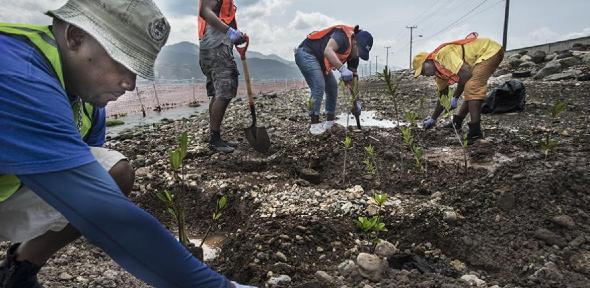
As part of COP26, we asked people in six regions to imagine a globally net zero, climate-resilient future. Here’s what they came up with.
To create a globally net zero, climate-resilient world by 2050, there are two things we need to know: what solutions are feasible, and what is desirable. The COP26 Futures We Want project brings these things together. Six groups of academic experts collated existing research and evidence on relevant risks, mitigation, adaptation and resilience solutions within the context of their region. Then, based on this evidence, six groups of citizens came together to share their hopes and ideas for the future. This gives us something new: visions of a globally net zero, climate-resilient world that people actually want to live in.
The COP26 Futures We Want project is releasing its findings just before the start of the international climate summit in Glasgow. The project was commissioned by UK Government in their role as COP26 President and has been coordinated by Cambridge Zero, the University of Cambridge’s climate initiative.
This collaboration involved communities from the UK, Jamaica, Brazil, Kenya, United Arab Emirates, Saudi Arabia, and India, and explored diverse views and solutions to address the real impacts of climate change, such as electricity generation, agriculture, waste and water management, building design, reforestation and ocean conservation.
“Work which addresses the global emergency of climate change at the regional level, and brings together academic and community perspectives, is a crucial part of building a climate-resilient world,” - Emily Marchant, Cambridge Open Engage Programme Manager, Cambridge University Press.
The final visions can be found on www.FuturesWeWant.world. Following on from the Visions, Cambridge Zero collaborated with the project’s International Expert Committee, the Met Office and academics in each region to compile the scientific evidence underlying the visions of each region into detailed papers, which are now freely available on Cambridge Open Engage via the links below. These peer-reviewed technical reports highlight many of the challenges and threats posed by the climate crisis, but also the wider benefits of ambitious climate action.
Arabian Peninsula (United Arab Emirates & Saudi Arabia):
- Climate change will exacerbate already extreme weather conditions and could make parts of the region uninhabitable by late-century, and adaptation will be essential.
- As a largely hot arid desert region, water scarcity is a critical issue and habitability is highly energy intensive, due to demands for cooling and water desalination/ irrigation, and heavy dependence on imports. Significant innovation across all sectors of the economy, including energy and water, the built-environment, food and agriculture, and transportation are required to tackle the high carbon footprint.
- Abundant renewable sources of energy, and energy systems expertise available in the region, combined with significant sovereign wealth available for investment, present unique opportunities to benefit from the net zero transition and position the region as a leader in the energy transition.
- The energy sector in Brazil primarily relies on hydroelectric power, which is promising in terms of low carbon emissions, but it is also vulnerable to changing rainfall patterns caused by climate change.
Full original University of Cambridge article.
Image: Mangroves from the nursery at the University of the West Indies at Port Royal are being planted at the bay opposite Kingston. Credit: United Nations Environment Programme

